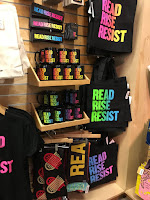One of the great opportunities of this conference is to see and talk to all the folks who are well-known in this field, with the additional bonus that they are all very interested in sharing their ideas (including tangible takeaways like handouts, web sites, online tools) and hearing what your ideas are. The conference started with workshops and moved into 4 days of sessions, with some carefully scheduled opportunities to step away from the more formal sessions and network with colleagues by exploring different aspects of the city - you could run in the morning, do some yoga, explore the food or museum scene, and even do some karaoke.
The sessions were focused on Leading in Times of Change, which is so broad that many ideas can fall under it. I focused primarily on sessions that addressed inclusion, diversity and equity topics and of course learning spaces. I found it interesting that not many sessions had any kind of technology angle, and that, instead, were sharing strategies and techniques.
One of the highlights for me was José Bowen's keynote, and even though I had seen and heard some of his speech before, the content had been changed enough, with other kind of data, that it was again very engaging. He certainly knows how to use the novelty and wow effect of data to engage with his audience. Key takeaways from his talk that higher education needs to focus more on process than content and that the curriculum should be seen as a tool box giving our students an assortment of tools to solve problems, be creative, and think and evaluate critically the world around them and their lives. He reminded us that we need to start where the students are (not where we hope they are) and that testing needs to be carefully designed so that it is not anxiety-producing but getting to the results we want - students showing to us and themselves that they have mastered a skill or knowledge set successfully.
In a different session, I was introduced to a new idea for practicing critical thinking which is authentic, geared primarily towards graduate students. The retraction watch,
https://retractionwatch.com, is a site that lists any research that is being retracted for small or more serious reasons. Having students analyze such an item to see what the problem is with reflection on how they can improve their own research can be helpful. Another resource are various preprint servers for different disciplines, where one can access manuscripts not officially published yet, to provide a kind critical review to the authors:
http://crosstalk.cell.com/blog/lets-talk-about-preprint-servers is one such preprint server.
Oh, and did I mention food trucks
and Powell's and Voodoo Doughnuts?


No comments:
Post a Comment